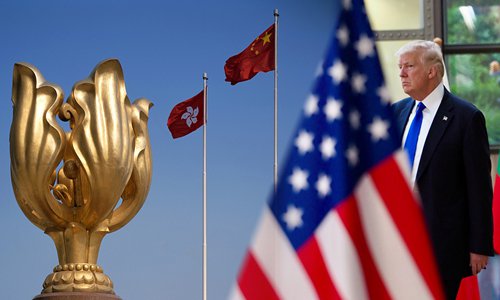HOME >> OPINION,SPECIAL-COVERAGE
HK unrest part of US attempt to spread its own brand of democracy
By Tang Fei Source:Global Times Published: 2019/8/19 20:38:39

Photo: VCG/Xinhua
US politicians and diplomats have been repeatedly accusing Hong Kong police of "cracking down hard" on "pro-democracy protesters" and criticizing the Chinese central government for the so-called erosion of democracy and freedom in the city. US House Speaker Nancy Pelosi said on August 13, "The [Hong Kong] Chief Executive and Legislative Council must finally, fully meet the legitimate democratic aspirations of the Hong Kong people." US Senate Majority Leader Mitch McConnell said on Twitter on August 12, "The people of Hong Kong are bravely standing up to the Chinese Communist Party as Beijing tries to encroach on their autonomy and freedom."
What are their intentions in interfering with China's domestic affairs?
US rhetoric plays a special role amid the current China-US strategic struggle. It helps the US pile pressure on China. When criticizing the Hong Kong Special Administrative Region (SAR) government and the Chinese central government, US politicians are also putting pressure on US President Donald Trump, arguing that he is not tough enough on the Hong Kong issue.
Against the backdrop of China-US rivalry, lawmakers and politicians in the US tend to adopt a more stringent China policy and use various pretexts to interfere with the country. Protests in Hong Kong are thus an ideal choice for them.
US politicians are hoping that if the Chinese central government mobilized the People's Liberation Army (PLA) in Hong Kong, the US would have justified excuses for comprehensive sanctions against China. But now, Hong Kong police have arrested some extremely violent protesters, a sign the chaos has been brought under control.
The same US politicians have grown impatient. Therefore, they have relied on scathing criticism of China to pile the pressure on the latter.
The US wants to export its brand of democracy not only to China but also across the world. Washington likes to change the social and political systems of other countries in line with US values and interests to reduce the threat of war.
China, which has a different system from that of the US, represents a significant challenge to the superpower. As a result, the US feels it should intervene in China's affairs and crank up efforts at peaceful evolution of China. Washington hopes one day China can be transformed the way US wants.
Before former US president Barack Obama's administration, Washington was tolerant of Beijing's economic reform. The US hopes China's economic reform would advance according to Washington's expectations.
After Trump took office, US elites, be it Democrats, Republicans, or observers from think tanks, all believe the previous strategy was wrong and comprehensively containing China was the only way to undo the mistake. They believe if US piling pressure on China could shake the Chinese central government's control over Hong Kong, Washington's containment strategy would win.
The Hong Kong SAR government proposed to amend an extradition bill in February. At that time, Hongkongers generally supported it. In March, American Chamber of Commerce in Hong Kong wrote a letter to Hong Kong's security chief, voicing their objections to the bill, reported the South China Morning Post. "Mainland criminal process has deep flaws, including lack of an independent judiciary, arbitrary detention, lack of fair public trial, lack of access to legal representation and poor prison conditions," reads the letter. After that, the public's attitude toward the bill started to change.
Since then, US politicians have repeatedly expressed concern of and opposition against the amendment, which has fueled resentment in Hong Kong.
Violent acts in Hong Kong, such as the one at Hong Kong International Airport, will only bring more chaos. It is hoped that young Hongkongers can stop focusing on US rhetoric that aims to mislead the public, but inject more energy in the city's economic development and livelihood.
The author is member of council of Chinese Association of Hong Kong and Macao Studies. opinion@globaltimes.com.cn
Posted in: VIEWPOINT,OPINIONS